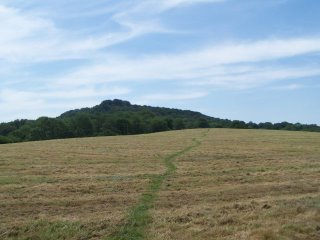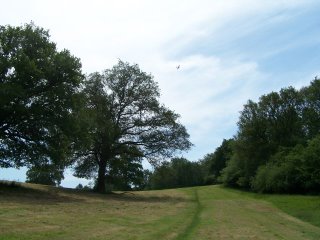A Short Walk in the Wiltshire Bush
I live in a valley. To the North is a range of low gentle hills that are about two miles distant and form a gentle horizon. To the South is a four-hundred foot sandstone ridge that rears up abruptly less than a mile away and seems to hang menacingly overhead. The steeper portions of the slopes are thickly wooded, the lesser gradients are still too steep for cultivation, but sheep and cattle without fear of hieghts can manage to graze on the lush green grass in dry weather; when it's wet they just slide helplessy down the slippery slope and cluster against the hedges at the bottom.
 At one point the ridge seems to jut both outward and upwards to a very prominent peak, although it is still too wooded to discern the exact outline of the ground. I had looked at that peak for months, wondering what it would be like to stand there and gaze out over the valley. One Saturday morning a few days ago, having been unable to get the garage to take the car in to look at the blowing exhaust, I decided I would climb that peak.
At one point the ridge seems to jut both outward and upwards to a very prominent peak, although it is still too wooded to discern the exact outline of the ground. I had looked at that peak for months, wondering what it would be like to stand there and gaze out over the valley. One Saturday morning a few days ago, having been unable to get the garage to take the car in to look at the blowing exhaust, I decided I would climb that peak.
 I had to go downhill first, following the railway line and then cutting across a field to the small river that gives the village its name. The blossoms in the hedgerows had begun to give way to Eliza Days.
I had to go downhill first, following the railway line and then cutting across a field to the small river that gives the village its name. The blossoms in the hedgerows had begun to give way to Eliza Days. I didn't realise until several hours later how sharp their thorns were, or how subtle, until the broken tips in my fingers began to throb. These photographs were obtained at a price.
I didn't realise until several hours later how sharp their thorns were, or how subtle, until the broken tips in my fingers began to throb. These photographs were obtained at a price.
I had a water bottle, but little food. The village fete was being held that day, and I decided it would be a nice touch to take lunch on the way, but when I entered the field the barbecue was still unlit and the only cakes and jams available were for judging, not for eating.


I carried on back out of the gates and crossed part of the common land. Whatever this is, I haven't seen it before, and I think it is an escapee from one of the gardens.
 I have also tried several times before to get a photograph of these flowering heads. only to have the shots appear blurred or indistinct. It is a lot harder than I suspected, because the camera autofocus is an untrasonic device, and this plant is too slender to echo enough sound back for the camera to work out exactly where it is. I must have been lucky on this day.
I have also tried several times before to get a photograph of these flowering heads. only to have the shots appear blurred or indistinct. It is a lot harder than I suspected, because the camera autofocus is an untrasonic device, and this plant is too slender to echo enough sound back for the camera to work out exactly where it is. I must have been lucky on this day.

I don't know if this was cultivated by a farmer with an interest in the bizarre, or the trees in this area have some incestous streak in them. Apparently the Elm trees that the Romans planted to line the roads grew very like this, connected half underground and half above ground by shared roots and trunks. This was their weakness that the Dutch Elm disease was able to exploit, for when one tree had it, the adjacent trees for hundreds of yards also succumbed.


In the distance is my destination peak. Something I have not really observed before is the path. I would have expected it to have been worn bare, but instead it is greener than the surrounding grass. I wonder if the particular plant grows more vigorously for being trodden on.



Since leaving the village I had been steadily climbing in the heat of the midday sun.
It was pleasant to escape from the open fields into the coolness of the trees. For a while the gradient eased, but this was only a temporary relief, it would soon become much steeper.

A small collection of houses huddled at the foot of the cliff, and the path I was following lead close to their back gardens, and someone's play area. The slope is greater than 1 in 3 for most of the climb, sometimes as steep as 1 in 1, and climbing it becomes a matter of scrambling from tree to tree.
The top was a great disappointment to me. The trees were so thick that it was impossible to see out over the valley, or discern the highest point, or even look down the slope and appreciate how steep it was.
 I found that the level ground behind the edge of the cliff was grazing land, ending abruptly with a few strands of barbed wire to stop the cattle plunging down the tree-tangled slope.
I found that the level ground behind the edge of the cliff was grazing land, ending abruptly with a few strands of barbed wire to stop the cattle plunging down the tree-tangled slope. As I walked along looking for another path to descend, I noticed some large moths. When I waited patiently for them to settle on bracken I found they were tiny, although each had giant antennae.
As I walked along looking for another path to descend, I noticed some large moths. When I waited patiently for them to settle on bracken I found they were tiny, although each had giant antennae.
 I had two choices, to either walk back along the road, or to scramble down the path I had climbed. I chose the path because I had spotted an intriguing fork in it just before the houses, and found a small weed-covered pond where early dragonflies were out and about.
I had two choices, to either walk back along the road, or to scramble down the path I had climbed. I chose the path because I had spotted an intriguing fork in it just before the houses, and found a small weed-covered pond where early dragonflies were out and about.
 A little further on I found this clump, each tongue well over a foot across. These are supposed to be edible, but I have never had the courage to try them. They are also rare, I have only ever seen one other clump of this size, a few miles away in the Blackmoor Vale.
A little further on I found this clump, each tongue well over a foot across. These are supposed to be edible, but I have never had the courage to try them. They are also rare, I have only ever seen one other clump of this size, a few miles away in the Blackmoor Vale.
I made my way back into the village and had to make do with chocolate cake and ginger parkin, nobody had thought to exhibit savoury items, apart from hamburgers and sausages on the barbecue, and I'm sticking to my quasi-vegetarian beliefs for now. The roads leading in and out of the village were lined with parked cars; nobody who is anybody walks where I live. But the ludicrous part of it all is that, for all the traction and horsepower in their 4x4 off-roaders, they couldn't have travelled to any of the places I had visited that day.











